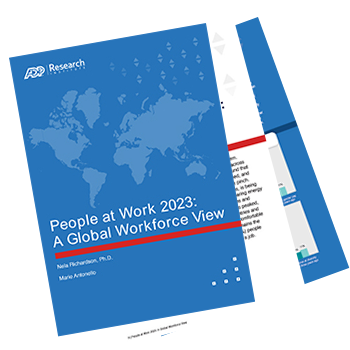Spotlight on: UK
No place for complacency – pay across the divide
As one of the world’s largest liberalised economies and the second largest in Europe, the UK is often regarded as the destination of choice for aspiring career-builders.
Although the UK enjoys a diverse, multicultural workforce and well-protected workers’ rights, this year’s research highlighted some concerns – especially around fair pay across the genders.
A closer look at UK workers’ opinions on pay and gender

Root causes
Of the UK workers dissatisfied with their jobs, 7% of women attribute this to the gender pay gap, versus 1% of men.

Pay priorities
More women (66%) rank ‘salary’ as the most important part of a job than men (59%).

Disappointing pay
More women (54%) than men (45%) are dissatisfied with what their employer is paying them.

Career progression
Men (50%) are more likely than women (45%) to say that their employer talks to them about career progression.

Relative improvements
32% of working men think their company has got better at gender pay equality compared to three years ago - only 21% of women agree.

Relative worth
60% of women consider themselves underpaid for their role, compared to 49% of men.

Eye on the prize
More men (29%) than women (22%) expect a bonus payout over the next 12 months.

Acceptable alternatives
41% of women would accept extra days’ annual leave in place of a pay rise, compared to 28% of men.

Are European employers’ reputations at risk?
Competition for talent in Europe is tough – especially considering how easy it is for employees to work in other countries.
Our research in France, Germany, Italy, the Netherlands, Poland, Spain, Switzerland and the UK shows that in some key aspects, employers are less generous or progressive than in other world regions.
From pay rises to the demand for action on DEI, European business leaders should consider how they compete for top international talent and keep their workforce satisfied and driven.
Download report
The world faces a chronic skills shortage
Get the knowledge you need to hold on to talent.
Download reportSpotlight on: Europe
Falling behind global competitors
This year’s research indicates that despite being viewed as one of the most progressive, employee-friendly groups of developed nations, Europe may be trailing other countries when it comes to positive workplace policies.
Let’s take a closer look:
Pay
Pay rises in Europe were lower than other regions, averaging 5.4%, a trend likely to continue. Worse, 60% of workers in Germany and Switzerland say they’re always, often or sometimes underpaid.
Wellbeing
European workers are least likely to say their employer provides financial wellbeing advice and less than half feel supported by their managers when it comes to mental health.
Job fulfilment
Employees across the continent are least satisfied with their job, with 38% saying they face increased responsibility without increased pay.
Diversity, equity and inclusion
Only 30% of Europe’s workforce would say 'My company has got better at gender pay equality compared to three years ago.’ And 30% say their employer doesn’t participate in any DEI initiatives.
Flexibility
Just over half (52%) of European employees feel empowered to take advantage of flexible working arrangements, but that could mean 48% are missing out on better work/life balance opportunities.
Career progression
Workers in Europe say they’re not satisfied with their career progression (32%) and training and development (30%); not far behind those dissatisfied with their salary at nearly 39%.
What do workers want and how can you deliver it?
Following one of the largest global surveys of its kind — undertaken between 28 October and 18 November 2022 — ADP Research Institute® brings you vital intelligence into the attitudes, aspirations, wants and needs of 32,612 workers in 17 countries, including 8,613 working exclusively in the gig economy.
How you can benefit from this research:
- Discover what your employees might really be thinking
- Adapt your approach to people recruitment, reward and retention
- Apply the findings to drive your business transformation
What employees want you to know:

Job satisfaction
While 87% feel optimistic about the future, 62% think no sector will escape the effects of the current economic uncertainty and almost four in 10 (37%) don’t feel secure in their jobs.

Pay and benefits
61% say salary’s the key factor in their job and 62% expect a pay rise from their current employer in the next year. Yet 43% are sometimes, often or always underpaid.

Mental health
Nearly half (47%) say their work suffers due to poor mental health while 65% claim stress adversely affects performance. Employers are responding through positive mental health initiatives.

Flexibility
Nearly half (48%) say they could relocate overseas with their existing employer. Workers now prioritise career progression and job enjoyment over flexible hours and locations.
Get your report now - discover key insights to better understand your workforce and transform your business.


